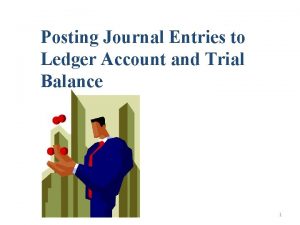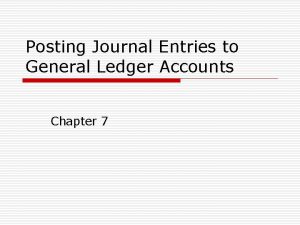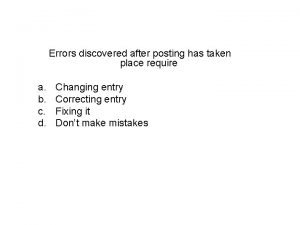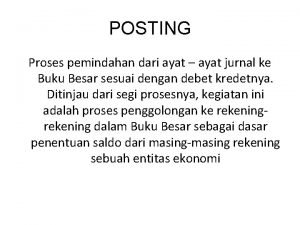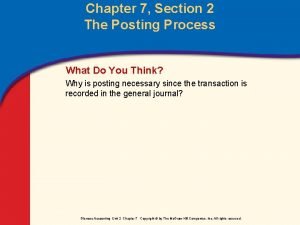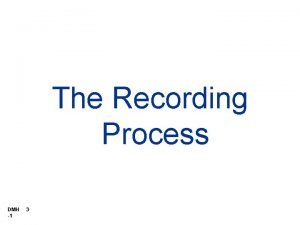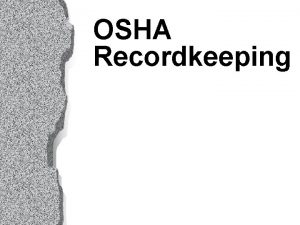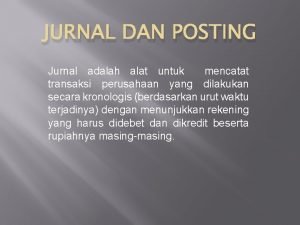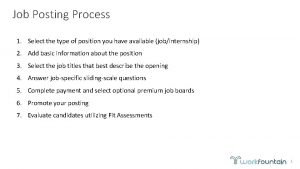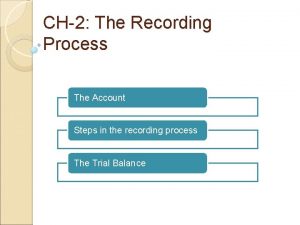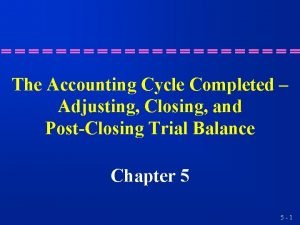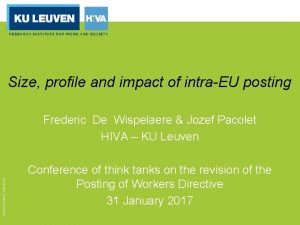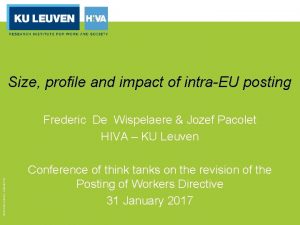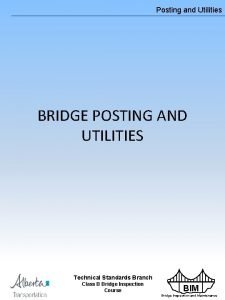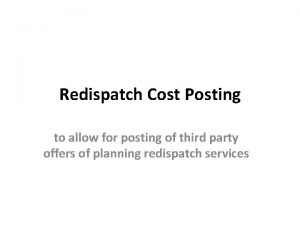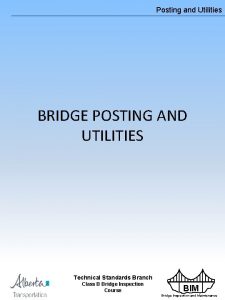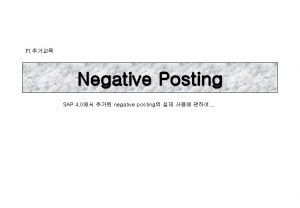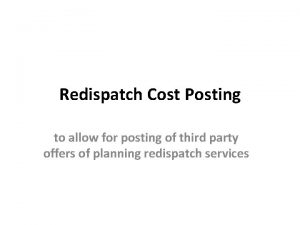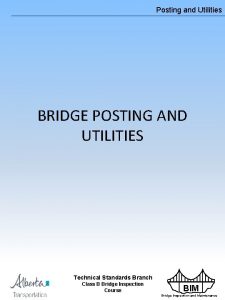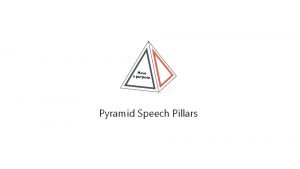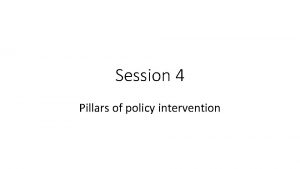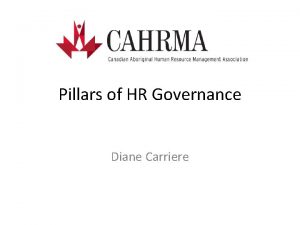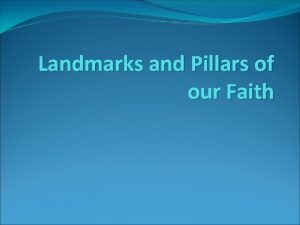The 4 key pillars of intraEU posting in



























- Slides: 27

The 4 key pillars of intra-EU posting in practice: information, registration, enforcement and monitoring Frederic De Wispelaere – HIVA KU Leuven Move. S seminar Croatia Zagreb, 25 October 2019 Funded by the

Introduction • It is an understatement to say that the topic of ‘posting’ stirs up strong emotions; • For some stakeholders, the amended PWD goes much too far, while other stakeholders argue that the new provisions will have little or no impact in practice; • The question is, however, whether it is really necessary to constantly pursue adjustments to the European rules applicable to posting. Funded by the

Introduction • After all, it seems like several provisions on • • • access to information, the registration of posted workers, enforcement, the exchange of information, data collection, and monitoring, which are laid down by the Posting of Workers Directive, the Coordination Regulations and the Enforcement Directive, are still underutilised. • In favour of a pragmatic approach which first fully endorses and implements the current legislative framework applicable on intra-EU posting. Funded by the

Access to information: Posting – A confused concept “Everyone talks about posting, but nobody knows exactly what it means” ‘Business trip’ = posting ? Funded by the

Access to information: A broad approach Posting of Workers Directive (Directive 96/71/EC) (Directive (EU) 2018/957) Enforcement Directive (Directive 2014/67/EU) Regulations on the coordination of social security systems (Regulation (EC) Nos 883/2004 and 987/2004) Lex specialis in the road transport? Tax law (183 -days rule) Directive on transparent and predictable working conditions (Directive (EU) 2019/1152) Funded by the

Access to information: The single official national website (Article 5 of the Enforcement Directive) • The ways in which Member States are approaching this task varies greatly; • Good practices are observed in, among others, Austria, Slovenia, Italy and Sweden. However, a number of websites are still not up to scratch; • Several websites only contain part of the information that the posting undertaking actually needs, as no information is available on social security law and tax law, or even on the applicable collective agreements; • Websites do not always refer to the application/declaration process of posted workers in both the Member State of origin (related to the application of the Coordination Regulations) and the host Member State (related to the application of the Posting of Workers Directive and the Enforcement Directive). Funded by the

Access to information: The single official national website (Article 5 of the Enforcement Directive) CROATIA Address Old: http: //www. mrms. hr/posting/posted-workers/ New: https: //mrms. gov. hr/o-ministarstvu-9/uprava-zarad-i-zastitu-na-radu/information-for-service-providers -performing-temporary-services-in-croatia-postedworkers-and-service-users/4197 Clear, transparent, comprehensive and easily Yes, but too much information, not structured. Difficult accessible to find what you need. Clearly indicated terms and conditions of employment No, all text is presented in one row, which makes it (stipulated in law or in case of Art 5 (4) in collective difficult to find information on a concrete working agreements) condition. Minimum wage stipulated only in Croatian currency, could be helpful to have it also in euros. Applicable collective agreements (to whom, which Yes, 1 universally applicable collective agreement in conditions) construction sector. Languages (official language(s) and most relevant) EN Most relevant according to A 1 data (2016): SI, DE Contact person at the liaison office indicated Yes. Funded by the

Access to information: Good practice Funded by the

Access to information: Some recommendations • Information should be offered from a helicopter view. Inform posting undertakings and posted workers about: • • • the use of posting (situations covered) and the differences of the notion in labour law, social security law and tax law; the application/registration procedures in both the sending and receiving Member State. Remark/proposal of the employers’ organisations included in the review of the Enforcement Directive: “a template for a uniform website would be a significant improvement when it comes to the clarity and accessibility of information” • Role of ELA? • Take a look at some good practices: Funded by the

Registration - outgoing: Request of a Portable Document A 1 • There is a great variety of practices among Member States with regard to the application procedure for a PD A 1. In many Member States, an electronic procedure to apply for a PD A 1 is implemented. • Before issuing a PD A 1, the competent institutions will (or at least should) check whether the posting conditions are fulfilled. To what extent these conditions are verified strongly differs among Member States. In general, four methods are used by the competent public authorities to verify whether the conditions are fulfilled: 1) 2) 3) 4) it is asked on the PD A 1 application form (declaration from the employer and/or questions); the competent institution asks for relevant documents (to be attached to the application); it is verified by consulting other electronic databases/registers by the competent institution; random checks on the submitted declarations. • Several Member States rely solely on the answer of the posting undertakings to the questions included in the application forms; • Several Member States do not or cannot verify these conditions. For instance, it is clear that it is almost impossible to verify the ‘nonreplacement condition’. Funded by the

Registration - outgoing: Request of a Portable Document A 1 in Croatia • In Croatia, the competent institution for issuing the PD A 1 is the Croatian Pension Insurance Institute (CPII). The competences for issuing a PD A 1 are divided between regional and branch offices; • The application forms are available at the CPII’s official website and once completed, they should be submitted to the competent regional or branch office by post or in person in paper form only; • The information in the application form is verified by using the information available from the Croatian Pension Insurance Institute’s Database database and information from other institutions. Funded by the

Registration - incoming: Prior notification tools Implemented a prior notification tool? Self-employed covered? Persons posted from countries outside of the EU-28/EFTA covered? Type of procedure BE BG CZ DK DE EE IE EL ES FR HR IT CY LV LT LU HU MT NL AT PL PT RO SI SK FI SE UK YES YES YES YES YES NO YES YES NO YES NO NO NO NO NO NO YES NO NO NO YES YES YES NO NO NO YES YES NO NO YES (other system) NO YES Electronically Post Mail/post Electronically Mail/post Mail/post/fax Electronically Post/ Electronically Mail Post Electronically/ mail Electronically Funded by the

Registration - incoming: Prior notification tool of Croatia • When providing services in Croatia, every service provider, is obliged to submit a posting declaration before the start of any service in Croatia; • The posting declaration should be submitted to the Labour Inspectorate electronically to the following e-mail address: postingdeclaration. inspektorat@mrms. hr • The form of the posting declaration is available at: https: //mrms. gov. hr/o-ministarstvu-9/uprava-za-rad-i-zastitu-naradu/information-for-service-providers-performing-temporaryservices-in-croatia-posted-workers-and-service-users/4197 Funded by the

Registration: Some recommendations • Introduction procedures; of user-friendly application / registration • The principle of sincere cooperation obliges the competent institutions to carry out a proper assessment of the facts relevant to the application of the rules for determining the applicable social security legislation and, consequently, to guarantee the correctness of the information contained in the PD A 1: please take this serious!; • Practical Guide on Posting: “Workers who are sent temporarily to work in another Member State, but do not provide services there, are not posted workers. This is the case, for example, of workers on business trips, attending conferences, meetings, fairs, following training etc. Such workers are not covered by the Posting of Workers Directives and the administrative requirements and control measures set out in Article 9 of Directive 2014/67/EU are therefore not applicable to them. ” – Exemptions should be applied by Member States! Funded by the

Enforcement • Several infractions of the conditions determined by Article 12 of Regulation (EC) No 883/2004: • • • no direct relationship between the posted worker and the employer; no substantial activities in the sending Member State, the employer only makes use of posting, inappropriate statements of the domestic activity, letterbox companies etc; falsification of documents (e. g. false PDs A 1 or false social security data); incorrect information provided by the applicant; bogus self-employment: wrong status of the person concerned; circumventing the application of Article 12: false evidence that Article 13 instead of Article 12 should be applied. Funded by the

Enforcement Fight against letterbox companies • Review of the Enforcement Directive was published by the Commission on 25 September 2019; • Link between posting and the existence of letterbox companies: ‘the presence or absence of substantial activities’; • A number of relevant indicators and ‘red flags’ can be found in the existing European legislation; • Enforcement Directive – Art 4(2) : Elements to determine whether an undertaking genuinely performs substantial activities • • Most of the Member States have provided for a list of elements identical to those in the Directive; + Croatia: the duration and frequency of an employer’s activity in the national territory, and whether it is performed occasionally or continuously. Funded by the

Enforcement Fight against letterbox companies in road freight transport • Number of PDs A 1 issued according to Art. 13 BR: a high percentage of truck drivers employed in Croatia is active in two or more Member States; • Regulation (EC) No 1071/2009 has introduced some important requirements for all transport undertakings authorised by a Member State, helping to clamp down on the phenomenon of letterbox companies: • to have an effective and stable establishment; • to be of good repute; • to have appropriate financial standing; • and to have the requisite professional competence. • Most Member States have implemented the requirements without additions. The most common additional requirement at the national level is for a parking space, which is specified in Austria, Bulgaria, Ireland, Slovakia and the UK. • Lack of enforcement capability / manpower? Funded by the

Monitoring by (the exchange of) data on intra-EU posting • “The more we know about posting, the better we can discuss it. ” • The lack of accurate and detailed data on posting might hamper the possibility to get a proper picture of the phenomenon, and to assess the legal, economic and social impact of this type of intra-EU labour mobility; • Data on posting are certainly not only necessary for scholars and policy makers. Also competent institutions in both the Member State of origin and the host Member State need data before, during and after the posting of workers. Funded by the

Monitoring by (the exchange of) data on intra-EU posting: Statistics Data from the A 1 form Data from the national prior notification tools Legal base Basic Regulation (EC) No 883/2004 and Implementing Regulation (EC) No 987/2009 Directive 2014/67/EU Area Social security Determined by Art. 12 of the Basic Regulation Terms and conditions of employment Determined by Art. 3(1) of the Posting of Workers Directive + (for some MSs: + self-employed and/or + posting undertakings established outside the EU 28/EFTA) Scope Exempted Persons active in two or more Member Several categories in some/most host MSs (for States (Art. 13 of the Basic Regulation); instance, persons attending business meetings or postings longer than two years; repetitive participation in seminars and lectures are not always required to register) + (by several MSs: + postings self-employed and/or + posting undertakings established outside the EU-28/EFTA) Enforcement In some cases, a posting may take place Implementation of a ‘simple declaration’ system is without the institutions being informed of a faculty given to Member States, not an it or the PD A 1 will be awarded with obligation. Most Member States implemented Funded by the retroactive effect sanctions in the event of non-registration.

Monitoring by (the exchange of) data on intra-EU posting: Evolution of the number of PDs A 1 issued Number of A 1 forms issued 3, 000 47, 773 2, 500, 000 1, 021, 509 2, 000 1, 500, 000 1, 729, 957 500, 000 0 2007 2008 2009 2010 2011 2012 2013 2014 2015 2016 PDs A 1 issued according to Art. 12 BR PDs A 1 issued according to Art. 13 BR Other Total (E 101) Funded by the 2017

Monitoring by (the exchange of) data on intra-EU posting: Posting vs active in 2 or more Member States 100% 90% 4% 2% 2% 2% 13% 15% 18% 21% 22% 25% 27% 76% 73% 71% 2013 2014 2015 2016 80% 2% 36% 70% 60% 50% 40% 83% 81% 30% 62% 20% 10% 0% 2010 2011 2012 PDs A 1 issued according to Article 12 BR PDs A 1 issued according to Article 13 BR Funded by the 2017 Other

Monitoring by (the exchange of) data on intra-EU posting: Number of PDs A 1 issued according to Article 12 BR by the sending Member States, 2017 PDs A 1 issued according to Art. 12 BR 350, 000 300, 000 250, 000 200, 000 150, 000 100, 000 50, 000 41, 253 0 DE PL SI IT ES FR SK BE PT HULU AT ROHR UK LT NL CHBG CZ DK EE EL FI IE SE NOLV IS MT CY LI 2016 2017 Funded by the

Monitoring by (the exchange of) data on intra-EU posting: PDs A 1 received according to Art. 12 BR Number of PDs A 1 received according to Article 12 BR by the host Member States, 2017 500, 000 450, 000 400, 000 350, 000 300, 000 250, 000 200, 000 150, 000 100, 000 12, 791 50, 000 0 DE FR BE AT NL CH IT ES UK SE LU CZNO PT FI PL DK SK HUHRRO EL SI IE BG EEMT LT IS LV CY LI 2016 2017 Funded by the

Monitoring by (the exchange of) data on intra-EU posting: Other relevant figures for Croatia • Size of outgoing postings almost doubled compared to 2014; • 2 out of 3 outgoing postings to Germany; • Most of the outgoing posted workers provide services in the construction sector; • Average duration posting: 261 days <-> EU average: 98 days; • Until 30 June 2020: • • Austria regulates access of Croatian workers to its labour market. Free movement of services from Croatia to Austria restricted in some sectors: Croatian workers who are to be posted to work in construction or ancillary construction trades require a work permit; in some other sectors, foreign placement permits [Entsendebewilligungen] are sufficient. • More than half of the incoming postings from Slovenia. Funded by the

Monitoring by (the exchange of) data on intra-EU posting: Internal Market Information system (IMI) Funded by the

Monitoring by (the exchange of) data on intra-EU posting: Internal Market Information system (IMI) Funded by the

Conclusion Intra-EU posting in practice: Member States can and must do better Funded by the
 Intraeu
Intraeu Intraeu
Intraeu Example of a business model canvas
Example of a business model canvas Key partners
Key partners Toastmasters secretary minutes template
Toastmasters secretary minutes template Journal to ledger posting examples
Journal to ledger posting examples Problem 7-7 journalizing and posting business transactions
Problem 7-7 journalizing and posting business transactions Nonlinear planning using constraint posting
Nonlinear planning using constraint posting Errors discovered after posting has taken place requires
Errors discovered after posting has taken place requires Posting to a general ledger chapter 4
Posting to a general ledger chapter 4 Chapter 11 test a accounting answers
Chapter 11 test a accounting answers Posting adalah proses pemindahan catatan dari
Posting adalah proses pemindahan catatan dari Job posting analytics
Job posting analytics Shadowposting
Shadowposting Trading account general ledger
Trading account general ledger Posting is the process of
Posting is the process of Posting in accounting
Posting in accounting Post. ref. accounting
Post. ref. accounting Dmh-1
Dmh-1 Osha log posting dates
Osha log posting dates Alat untuk mencatat transaksi
Alat untuk mencatat transaksi Job posting process
Job posting process Siue ga posting
Siue ga posting Posting normally occurs before journalizing
Posting normally occurs before journalizing Posting normally occurs before journalizing
Posting normally occurs before journalizing Posting normally occurs before journalizing
Posting normally occurs before journalizing Three column form of account
Three column form of account Journalizing and posting adjusting and closing entries
Journalizing and posting adjusting and closing entries





